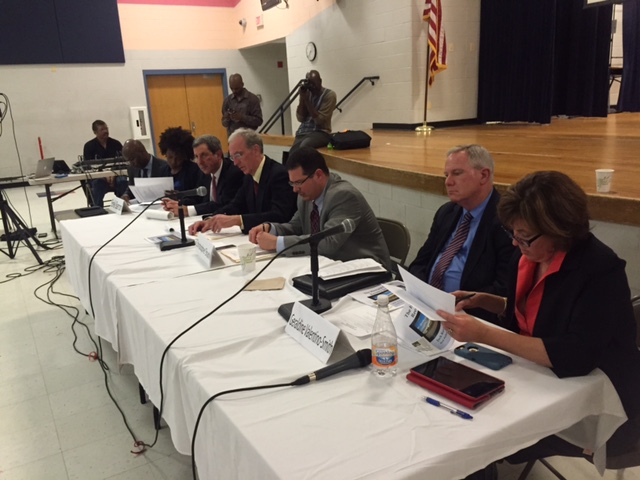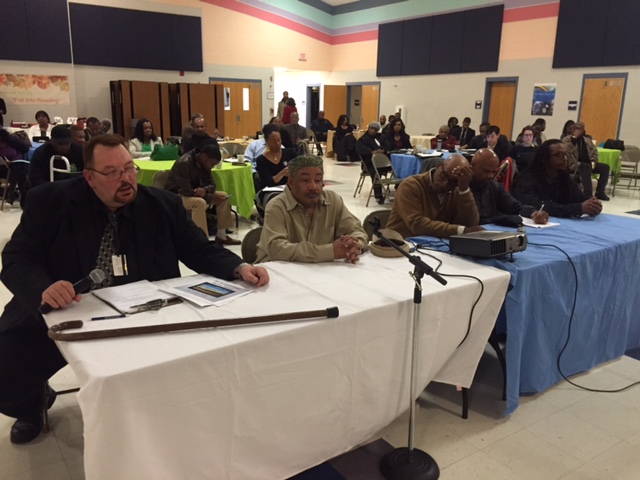Summary of Comments at the Fourth Stakeholders Meeting
Sponsored by the Justice Reinvestment Coordinating Council
November 18, 2015 Forestville, Maryland
Christopher Shank, Executive Director of the Justice Reinvestment Coordinating Council (JRCC), convened the fourth and final stakeholder meeting of 2015 at the Suitland Community Center in Forestville, Maryland. The meetings, required by law, are intended to inform the JRCC’s initial recommendations. Council members present included Caryn Aslan (Job Opportunities Task Force); Delegate Geraldine Valentino-Smith; and David Eppler, Attorney General’s Office. Don Hogan and Cara Sullivan, representing the Governor’s Council on Crime Control and Prevention, also attended.
Joanne C. Benson, a Maryland State Senator, told the gathering that the Black Caucus within the state legislature will be considering stakeholders’ recommendations. She noted that most of those incarcerated are African American, and many could not afford legal representation. Often, they chose a plea bargain without understanding the consequences.
Joseline A. Pena-Melnyk, Maryland State Delegate from the 21st District, urged stakeholders to fill rooms in which important legislation is being discussed by state representatives. Too often, recommendations die that might have gone forward if people understood there was real public concern.
Over fifty stakeholders attended the meeting, in which a series of panels presented on issues related to incarceration and re-entry. Service providers represented at the meeting included:
- The Key Bridge Foundation, which operates a conflict resolution center that offers opportunities for restorative justice.
- No Opportunity Wasted, which visits prisons to provide information and re-entry and encourages employers to hire returning citizens.
- Eli Allen Civic Works, which provides skill training for over 100 returning citizens annually.
- People for Change, whose membership includes 300 nonprofit organizations involved in re-entry, addressing the needs of families, breaking the intergenerational cycle of incarceration, and providing education.
- The Howard County Department of Corrections, which is working to integrate employment services, provide programming for people who are incarcerated, and secure identification in every local detention center. The department also ensures that people released from custody have bus passes.
- The Fund for Kids Foundation, which provides community-based programming and a source of diversion options for young offenders.
- We Lead by Example, Inc., which works with youth and attempts to prevent incarceration.
Issues highlighted by stakeholders included the following.
Pretrial
- Many people are currently in jail not because the public needs to be protected from them, but because they are poor and cannot afford bail.
Incarceration
- A returning citizen’s son spoke of the need for programs to help children get to know their incarcerated parents and to keep them from making the wrong choices.
- Profits from phone calls and video meetings should not be allocated to prisons, but instead used to help prisoners and their families.
Release and Re-entry
- People released from prison need funding for transportation, food, and immediate expenses, without which they may be unable to support themselves as they re-establish themselves in the community.
- A returning citizen stressed the need to help people use entrepreneurial skills to succeed in legal activities.
- It is essential to offer help before the person arrives in the community so the person knows where to go.
Barriers to successful re-entry cited by presenters include:
- Service providers often do not know when people are going to be released.
- Some counties issue ID cards that are not helpful in securing employment rather than helping people secure birth certificates and social security numbers.
- Halfway housing and other facilities are often placed in the middle of “Dopeville,” where returning citizens find it easy to return to old behaviors.
- Services are often spread across a distance. A “one stop shop” for returning citizens would be helpful.
Some supervisors show a lack of professionalism. Sometimes people are returned to prison because of careless errors on the part of the supervisor, such as identifying the wrong person as the source of a “dirty” urine sample.
















